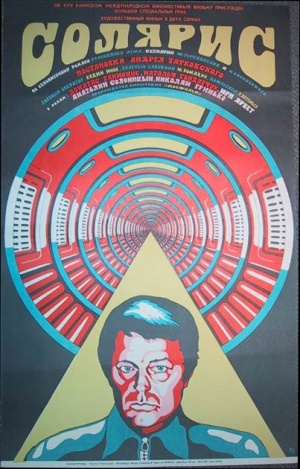Difference between revisions of "Solaris: film 1972"
| Line 1: | Line 1: | ||
| − | Solaris (Russian: "Солярис") is a 1972 film directed by Andrei Tarkovsky based on Stanislaw Lem's novel Solaris (1961). The meditative psychological drama takes place mostly aboard a space station orbiting | + | Solaris (Russian: "Солярис") is a 1972 film directed by Andrei Tarkovsky based on Stanislaw Lem's novel Solaris (1961). The meditative psychological drama takes place mostly aboard a space station orbiting a fictional planet. |
| − | While Stanislaw Lem's novel deals with the ultimate inadequacy of communication between human and non-human species Tarkovsky's adaptation is a “drama of grief and partial recovery” that concentrates on thoughts and | + | While Stanislaw Lem's novel deals with the ultimate inadequacy of communication between human and non-human species Tarkovsky's adaptation is a “drama of grief and partial recovery” that concentrates on thoughts and consciences of scientists studying extra-terrestrial life. |
Solaris features Natalya Bondarchuk (Hari), Donatas Banionis (Kris Kelvin), Jüri Järvet (Dr Snaut), Vladislav Dvorzhetsky (Henri Burton), Nikolai Grinko (Kris Kelvin’s Father), Olga Barnet (Kris Kelvin’s Mother), Anatoli Solonitsyn (Dr Sartorius), and Sos Sargsyan (Dr Gibarian); the music score was composed by Eduard Artemyev. At the 1972 Cannes Film Festival the film won the Grand Prix Spécial du Jury, the FIPRESCI prize and was nominated for the Palme d'Or. | Solaris features Natalya Bondarchuk (Hari), Donatas Banionis (Kris Kelvin), Jüri Järvet (Dr Snaut), Vladislav Dvorzhetsky (Henri Burton), Nikolai Grinko (Kris Kelvin’s Father), Olga Barnet (Kris Kelvin’s Mother), Anatoli Solonitsyn (Dr Sartorius), and Sos Sargsyan (Dr Gibarian); the music score was composed by Eduard Artemyev. At the 1972 Cannes Film Festival the film won the Grand Prix Spécial du Jury, the FIPRESCI prize and was nominated for the Palme d'Or. | ||
Revision as of 12:46, 9 May 2011
Solaris (Russian: "Солярис") is a 1972 film directed by Andrei Tarkovsky based on Stanislaw Lem's novel Solaris (1961). The meditative psychological drama takes place mostly aboard a space station orbiting a fictional planet.
While Stanislaw Lem's novel deals with the ultimate inadequacy of communication between human and non-human species Tarkovsky's adaptation is a “drama of grief and partial recovery” that concentrates on thoughts and consciences of scientists studying extra-terrestrial life.
Solaris features Natalya Bondarchuk (Hari), Donatas Banionis (Kris Kelvin), Jüri Järvet (Dr Snaut), Vladislav Dvorzhetsky (Henri Burton), Nikolai Grinko (Kris Kelvin’s Father), Olga Barnet (Kris Kelvin’s Mother), Anatoli Solonitsyn (Dr Sartorius), and Sos Sargsyan (Dr Gibarian); the music score was composed by Eduard Artemyev. At the 1972 Cannes Film Festival the film won the Grand Prix Spécial du Jury, the FIPRESCI prize and was nominated for the Palme d'Or.
| Solaris | |
|---|---|
 Soviet film poster | |
| Directed by | Andrei Tarkovsky |
| Produced by | Viacheslav Tarasov |
| Written by |
Screenplay: Fridrikh Gorenshtein Andrei Tarkovsky Novel: Stanisław Lem |
| Starring |
Natalya Bondarchuk Donatas Banionis Jüri Järvet Vladislav Dvorzhetsky Nikolai Grinko Anatoly Solonitsyn |
| Music by | Eduard Artemyev |
| Cinematography | Vadim Yusov |
| Editing by | Lyudmila Feiginova |
| Studio | Mosfilm |
| Distributed by | Goodtimes Enterprises |
| Release date(s) |
'France: May 13, 1972 (Cannes Film Festival) USSR: February 5, 1973 |
| Running time | 165 minutes |
| Country | USSR |
| Language | Russia |
| Budget | $1,000,000 (estimated) |